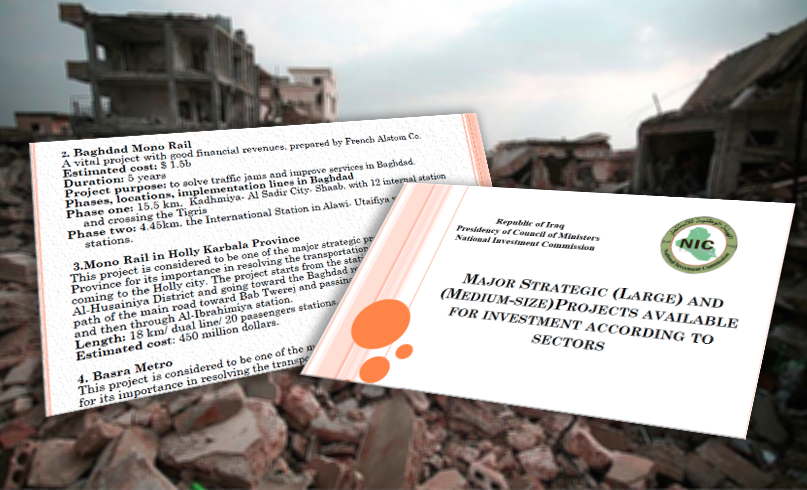Those familiar with previous proposed infrastructure projects throughout Iraq’s history will be quick to recognise that few new ideas will land at tables where lending agencies, donors and states will be seated. The government hopes to lure investors back to jumpstart projects that were abandoned due to scarce funds, resources or circumstances that wars invite.
The patchwork of information formulated at Iraqi premier Haider al Abadi request, fails to specify a deadline, schedule or the means needed for reconstruction. The greatest number of projects proposed are agricultural, followed by projects that fall under the oil and refinery sector. The lowest number goes to the ‘tourism and recreational’ sector, followed closely by housing. Oil-based investments are prioritised over the non-oil sector which, if not bridged, will deepen the gulf.
Extravagant proposals to fix and build new railway lines also raises the fear of a national plan that is out of touch with the security arrangements that citizens have learned to organize their lives around. Until national security matters are dealt with, the vision of crosscountry rail lines is little more than a pipe dream as a country littered with checkpoints attests to. It does create greater chances of generating income by commercialising the pilgrimage season to compete with other religious centres in the region.
The unequal geographic distribution of infrastructural projects suggests an attempt to satisfy Iraq’s ethno-sectarian quota, to placate the sect the government claims to govern in the name of. In light of the liberation of Iraq’s second largest city, the priorities of the state appear confused. Almost 80% of the projects are focused around areas in the south of Iraq, whilst those planned in destroyed provinces account for less than 20%. Over-investment across one geographic concentration will resultinantly create shortages in other areas of the country. Development of Mosul’s International Airport at the cost of 120 billion Iraqi dinars (101 million USD) is proposed but beyond proposals for new railway lines expected to pass through Mosul, little else is mentioned.
Another commitment sold by the report is the restoration of dilapidated oil infrastructure and the construction of smaller refineries to meet local needs. The plan is poorly articulated, and while small refineries are easy to build they are unlikely to boost domestic growth. Higher production of oil byproducts, if achieved, would allow the government to make up for lost earnings. Such revenue gains means less cash at the disposal of citizens, allowing state-controlled banks to cash in — another confused priority is the use of people as fundraising tools at the state’s disposal.
Estimated costs exist for approximately a quarter of the investments proposed is another prevailing blindspot. They tally up to a whopping $50 billion, but as a middle income country whose debts have surpassed earnings and cash returns donors and creditors will not be pledging their hard currency.
Another weakness is the report’s inability to catalogue the donor preconditions Iraq will be slapped by and their overall impact on the future shape of the economy. Will there be any assurances of completion or simply an occasion to place Iraq on sale and wash bidders make ostentatious promises.
The report makes a few of its own.
The $6 million project to build the grand port of Faw is one, an old idea unduly and repeatedly stalled. The new Karbala city project that aims to build 25 thousand housing units lacks one very important component, the staff such a project demands. The shortage of technicians or simply the size of the labour force needed, may increase Iraq’s dependency on foreign staff and is not without added costs.
For those looking for a brighter future and reconstruction of Iraq, the statistics are damning. Out of a total of 38 projects in the leaked report only 8 are actually in the areas left destroyed after ‘liberation’.
The greatest price of all, is public confidence, shaken once again by a political process pedalled by hoards of self interested parties. The timing is important to take not, it comes a few months before Iraq’s elects a new or settles for its existing leader. It is the first time a donor conference has been dedicated to the task of postwar reconstruction, allowing the corrupt to act as they always have but this time protected under the claim of absolute transparency.


 RSS Feed
RSS Feed